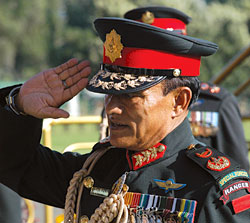 MIN RATNA BAJRACHARYA |
Playing by the rule, Katuwal then went and vented his frustrations with the prime minister and then the defence minister. Due process is being followed and an outcome acceptable to all can be expected.
The relationship between organs of the ancien r?gime and a post-revolution government is nowhere easy. It takes time for old animosities to die and new understanding to develop. In Nepal, the process is further complicated by the unsettled issue of Maoist combatants interned at temporary camps who anxiously wait for their final fate. There is also proof that the decision not to accept the tenure extension of the generals was a Maoist party decision and did not have the nod of the members of the coalition.
However, it was hasty of Girija Prasad Koirala to hit the panic button and urge his supporters to oppose what he called this "political intervention" in the army by the Maoists. During his every stint in Singha Darbar in the past 15 years, Koirala put the interest of the instruments of state over political priorities.
His enduring attachment with elements of status quo began the day he declared from the Khula Manch in 1990: "This is also the victory of Panchas" and was booed by the crowd. More recently, he took a huge political risk by appointing Katuwal as CoAS in August 2006 despite protests from human rights groups, civil society, the media and his own cadres. Earlier, the Rayamajhi Commission had named Katuwal among those responsible for excesses repressing the April Uprising.
The love-hate relationship between the army and the Koirala family has a long history. Matrika Prasad, the eldest of the Koirala brothers who became the first civilian prime minister of the country, tried his best to improve his political fortunes by flouting the 'General' honorific title bestowed upon him by King Tribhuban. The army brass laughed it
off, and the best Matrika managed in his later years was an ambassadorship in Washington.
The second brother BP Koirala became the first elected prime minister of the country. BP was emboldened by the charm offensive of army generals and was led to believe that his attempts of institutionalising civilian control over the army would not be resisted. But when he began to modernise the army, officers of the force conspired with the king to put him in jail. Despite his stature, popularity and closeness with King Mahendra and King Birendra, BP could never lead the nation again.
Girija Prasad, the third of the Koirala brothers to head the government, had to bow out in disgrace when the army kept him in the dark about the Narayanhiti Massacre in June 2001 and ignored his order to rescue a besieged police force in Holeri soon after. Still, he wooed the brass. It is ironic that the Koirala father-daughter duo is so despised in the Officers' Mess at Bhadrakali.
It's an uncomfortable reality, but the NC and UML leadership need to accept that they lacked the courage to face the Nepal Army when generals refused to obey the civilian command, ignored decisions of the government and made snide remarks about politics and politicians.
It's hard to play by the rules if no one knows what the new rules are. If the Maoist Defence Minister is bent upon exacting revenge for his humiliation during the row over recruitments in the army, this needs to be exposed politically. Personal pique can't be the basis for government policy decisions. But blindly supporting the generals every time they decide to throw a tantrum doesn't help either in restoring the morale of the Nepal Army.



